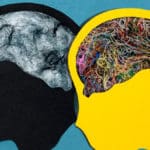As one of the preeminent treatment providers for New York TMS, Mid City TMS has always been at the forefront of medical breakthroughs. We are excited to announce our new Theta Burst TMS treatment option. Theta Burst TMS, also known as TBS, employs a new way of applying TMS’ trusted, effective, noninvasive, and nonconvulsive brain stimulation.
In August of 2018, MagVenture was the first TMS machine developer to gain FDA approval for a Theta Burst equipped device as an indicated treatment option for major depression. MagVenture has deemed TBS “Express TMS,” and with good reason–TBS sessions are about 10 times faster than traditional TMS treatments.
Mid City TMS’ new, TBS treatment option allows us to customize patients’ treatment plans, including as a long-term maintenance TMS treatment option.
How Theta Burst TMS Works
While traditional TMS employs 10 Hz magnetic frequency for 20-40 minutes, TBS uses 50 Hz magnetic frequency for just three minutes. TBS sends three rapid bursts every fraction of a second, mimicking the brain’s neuronal pattern of firing theta waves.
Theta brain waves are considered the keys to learning, memory, and intuition. They cause the mind to focus on signals from the external world, rather than on its sensory details. Theta brainwaves are primarily experienced in sleep; however, they can also be achieved through meditation. Some find themselves in a theta brain state while performing tasks such as showering or freeway driving–periods where many people feel they get their best ideas.
A metanalysis study, published in 2017, tracked the results of patients who received TBS treatment for major depression. Data were obtained from 5 randomized, controlled trials from 2001 through 2016, totaling 221 subjects with major depression. The researchers compared the treatment outcomes of patients from both active and sham TBS groups on the Hamilton Depression Rating Scale (HAM-D). The data revealed patients’ HAM-D scores significantly improved post TBS treatment. Active TBS was associated with significantly higher response rates compared to sham TBS (35.6% vs. 17.5%, respectively).
TMS treatment pioneer and the Chair in Psychiatry at the Medical University of South Carolina in Charleston, Mark George, M.D., described TBS as a way for physicians to speak the brain’s language: “If you could somehow just listen in on the brain talking, these rapid-fire bursts are the sounds you would hear.”
Theta Burst TMS Backed By Largest Trial to Date
The largest double-blinded, randomized TBS trial to date was published in 2018. Patients between the ages of 18-65 from three separate Canadian university hospitals were used to compare the effectiveness and patient experience with TBS and traditional TMS.
The study spanned three years. It divided its 414 patients into two randomized groups, treating 205 patients with standard, 10 Hz TMS and 205 patients with 50 Hz TBS.
The results revealed the effectiveness of both methodologies. The researchers used the Hamilton Rating Scale for Depression (HRSD-17) to analyze the patients’ treatment outcomes. The group treated with standard TMS improved their HRSD-17 scores from 23.5 to 13.4 and the TBS patients improved their scores from 23.6 to 13.4.
The only notable difference between TBS and standard TMS was in the patients’ comfort levels. Given its increased frequency levels, a greater number of patients indicated discomfort associated with TBS treatment. However, patient discomfort was mild and did not affect dropout rates; both TBS and standard TMS retained over 90% of their patients’ through the course of the trial.
TBS Benefits Executive Function
Executive function is an umbrella term referencing the neurologically directed mental control and self-regulation abilities that affect a person’s capacity to set and achieve goals. It relies heavily on prefrontal activity. Examples of executive function skills are: inhibition, working memory, organization, and emotional control.
A large number of people who suffer from depression, including medication resistant depression (MRD), experience impaired cognitive function both during depressive episodes and periods of remission. Impaired executive function is the most commonly experienced cognitive impairment for MRD patients.
A 2015 study published in Progress in Neuro-Psychopharmacology and Biological Psychiatry was conducted to measure the effects of intermittent TBS (iTBS) and continuous TBS (cTBS) on executive function cognitive abilities. iTBS is the TBS modality most commonly used, including at Mid City TMS, when using TBS (rather than standard TMS) to treat depression. The researchers used the findings of prior studies to guide their own trial. Previous research showed that intermittent iTBS effectively produces cortical excitability and continuous cTBS effectively diminishes cortical excitability.
This 2015 study randomly assigned 60 MRS patients to four distinct groups: A: cTBS 1800pulses/session; B: iTBS 1800pulses/session; C: a combination of cTBS+iTBS, 1800pulses/session for each; and D: sham TBS. All patient groups’ executive function abilities were tested using the Wisconsin Card Sorting Test (WCST). Group B, which received just iTBS, achieved the most significant improvement in their post-treatment WCST score. The study found that iTBS is an effective method for improving executive function in patients with and without depression.
Theta Burst TMS in New York City
Both researchers and clinicians are enthusiastic about TBS as a new transcranial magnetic stimulation methodology. TMS has been changing the lives of people with treatment resistant depression for years.
Dr. Bryan Bruno, the Medical Director of Mid City TMS, has treated severely depressed patients for fifteen years as Director of an inpatient psychiatric unit and for over twenty years in outpatient private practice. When TMS gained FDA approval in 2008, he was delighted to offer it to patients with treatment refractory depression. Dr. Bruno feels privileged to be a part of a community of TMS providers who have made TMS more of a mainstream treatment option. Unfortunately, there are still many patients with depression who don’t know about TMS, including the different methodologies that can be tailored to each patient. Our new theta burst TMS treatment allows us to craft more individualized treatment plans and help our patients with a more convenient option. In addition, although index courses of TMS are almost always covered by insurance, maintenance TMS is not yet covered by insurance. Because it can be performed more economically, Theta Burst TMS is a lower cost option for maintenance TMS for those patients who would prefer to avoid the cost of standard TMS.
Contact our office to find out if Theta Burst TMS is right for you.



